Scientists call for ban on logging in federal mature, old growth forests
Woodwell
Climate experts among nearly 200 signatories of open letter to federal officials
Maddie Rocklin Associate Vice President, 90 West
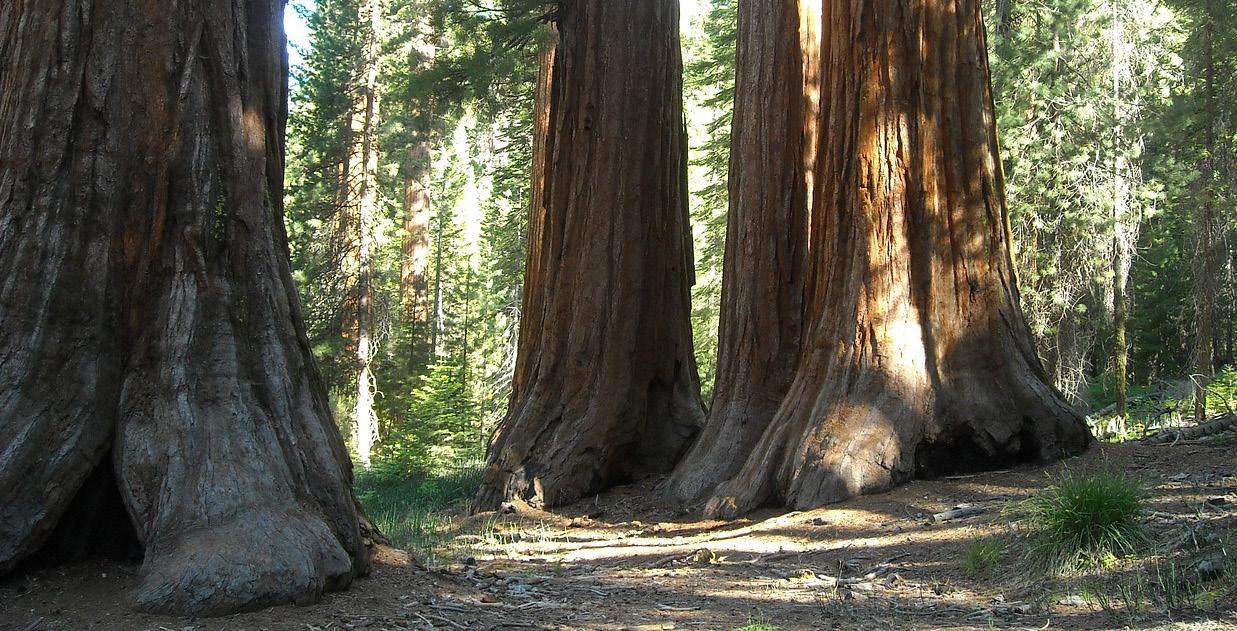
Scientists from Woodwell Climate Research Center are among the 195 leading experts in forest ecosystems, climate change, and the carbon cycle who have come together to urge the Biden Administration to immediately declare a moratorium on all logging in mature and old-growth forests on federal lands. The signers include seven members of the National Academies of Sciences and some of the most notable names in climate science.
The letter comes amid growing concerns within the scientific community around the U.S. Forest Service and Bureau of Land Management’s response to an executive order, issued by the Biden Administration on Earth Day 2022, to establish guidelines and best practices to safeguard mature and oldgrowth forests on federal lands. The letter was initiated by Dr. Beverly Law, Professor Emeritus at Oregon State University, and Dr. Bill Moomaw, Professor Emeritus at Tufts University and Distinguished Visiting Scientist at Woodwell Climate. Last week, Woodwell Climate Senior Scientist and signatory Dr. Rich Birdsey delivered the letter’s message to the Mature and Old Growth Science Summit, hosted by the Forest Stewards Guild, the U.S. Forest Service, and the Society of American Foresters.
“Old-growth forests are made up of our oldest, and typically largest, trees that store massive amounts of carbon,” said Dr. Rich Birdsey. “We need to protect old growth, as well as younger mature forests that can attain old-growth characteristics with time.”
“The carbon storage function these forests play is essential to our efforts to reduce carbon emissions and mitigate the impacts of the rapidly changing climate, yet millions of acres of mature and old-growth forests stand on federal lands that are vulnerable to logging,” said Dr. Beverly Law. “To align
with the United States’s commitments to ending global forest deforestation and degradation, we must urgently halt any additional logging of these critical natural resources.”
The scientists point to recent efforts by the agencies to increase timber sales and logging of these forests rather than increasing their protection as directly contrary to these objectives, and call on President Biden to issue a new executive order prohibiting activities that further forest degradation in the short-term, while the Administration works, in partnership with policy and climate leaders, to develop and implement effective, longterm management policies. Reducing timber harvesting of carbon-dense forests can have an immediate effect of lowering emissions and is the most significant action that the U.S. can take to immediately limit greenhouse gasses.
“With their 2022 executive order to protect mature and oldgrowth forests, the Biden Administration laid the groundwork for the U.S. to emerge as a global leader in conserving these forests and making good on international climate commitments,” said Dr. William Moomaw. “Halting logging in the interim is necessary to protect these resources now, while also working with the agencies to develop strong, long-term policies consistent with the Administration’s commitments to addressing climate change and safeguarding forests as a natural climate solution.”
Read the full letter sent to the White House at: https://bit.ly/logging-ban MORE 02 Monthly Newsletter

Leading ecologists call for strengthening nature-based climate solutions at the Federal level
The collaborative group says a solid scientific basis is essential for meaningful climate mitigation
Leading U.S. scientists and policy experts with a broad range of expertise in the fields of climate and ecosystem sciences have outlined key recommendations aimed at bolstering the scientific foundation for implementation of Nature-based Climate Solutions (NbCS) across the nation.
These solutions, which include strategies like protecting carbon-dense forests and wetlands, improving land management, and restoring natural ecosystems, are crucial for enhancing carbon dioxide removal from the atmosphere and reducing greenhouse gas emissions. The stakes are very high—getting NbCS right could mean the difference between achieving long-term global greenhouse gas reduction goals or missing those targets and further destabilizing the climate system.
Although NbCS strategies have potential, on the ground implementation of NbCS has been controversial, often outpacing the scientific understanding of their longterm benefits. The group calls for a more robust, evidence-based approach for NbCS so they can be deployed when and where they are most likely to succeed as climate solutions.
Key recommendations for advancing NbCS:
1 Open and accessible data and code
Data and products generated by federal agencies or through external partnerships openly and freely accessible. This transparency is vital for driving science forward and developing next-generation approaches for measuring, monitoring, reporting, and verifying (MMRV) the effectiveness of NbCS. Such openness will facilitate collaboration among non-federal scientists, state and local government officials, and resource managers, ensuring that NbCS projects are based on the best available science.
2 Establish a hierarchical “network-of-networks”
To accurately quantify the carbon benefits of NbCS, the team advises the creation of a hierarchical system of ecosystem monitoring networks that tracks how carbon moves through ecosystems using soil carbon, forest inventory, and flux measurement data. This system would leverage a range of scientific tools and apply them across various spatial scales, enabling scalable quantification of carbon sequestration and emissions reductions. By incorporating more modern measurement techniques and robust datasets, this approach aims to provide a more comprehensive understanding of NbCS impacts.
continued on next page
Howland Forest Swamplands in Howland Forest, Maine. / photo courtesy of Kathleen Savage
03 March 2024
Detailed maps are needed to monitor baseline management regimes and attribute carbon outcomes to specific management and disturbance shifts. Such mapping is essential for extrapolating point-based monitoring to broader assessments at policy-relevant scales. Improved accessibility and resolution of data on NbCS-relevant management practices will support more accurate evaluations of NbCS effectiveness.
A call to action
The group calls on Federal policymakers and program administrators to make implementing a more robust scientific foundation for NbCS an urgent priority.
These recommendations come at a critical time, as recent federal initiatives, such as the Inflation Reduction Act of 2022, and private-sector investments have significantly increased funding for NbCS projects and initiatives to monitor greenhouse gas emissions in forests, croplands, and wetlands. However, to ensure these investments lead to meaningful climate mitigation, a solid scientific basis is essential.
“We’re at an inflection point—we need better science to get this right,” said Dr. William Anderegg, Director of the Wilkes Center for Climate Science and Policy, and School of Biological Sciences, at the University of Utah. “These proposed measures aim to address current gaps in knowledge and data, providing a pathway to more credible and effective NbCS programs.”
The scientists’ call to action underscores the urgency of developing a coordinated approach to MMRV land-sector greenhouse gas exchanges. By prioritizing open data sharing, establishing a hierarchical network-of-networks, and improving large-area mapping, the United States can lead the way in creating robust NbCS programs that deliver tangible benefits for biodiversity, communities, and the climate.
“New federal initiatives offer unprecedented and exciting opportunities to develop more robust NbCS programs for the United States. But to succeed, these initiatives must be grounded in transparency and fully leverage the best available science,” said Dr. Kim Novick, at the O’Neill School of Public and Environmental Affairs, Indiana University.
The collective expertise of the scientific community, coupled with strategic coordination and investment, can pave the way for a future where nature-based solutions play a pivotal role in combating climate change.
“Nature-based Climate Solutions are critical pieces of the puzzle that is our climate future,” said Dr. Jonathan Sanderman, a senior scientist with the Woodwell Climate Research Center. “But to figure out where they fit, we have to know what they’re capable of and be able to measure their success. These recommendations offer a pathway for science-based implementation of NbCS across the U.S.”
 Swamplands in Howland Forest, Maine. / photo courtesy of Kathleen Savage
3 Large-area mapping of land cover, use, disturbances, and management activities
Swamplands in Howland Forest, Maine. / photo courtesy of Kathleen Savage
3 Large-area mapping of land cover, use, disturbances, and management activities
Read the full article in the Proceedings of the National Academy of Sciences: https://doi.org/10.1073/pnas.231850512 MORE 04 Monthly Newsletter
Fund for Climate Solutions awards five new grants
From the Arctic to the tropics, the 2024 winter cohort of FCS projects fills information gaps to produce actionable insights
Margaret Lin Communications Manager
The first round of 2024 Fund for Climate Solutions (FCS) awardees has been announced. The FCS advances innovative, solutions-oriented climate science through a competitive, internal, and cross-disciplinary funding process. Generous donor support has enabled us to raise more than $10 million towards
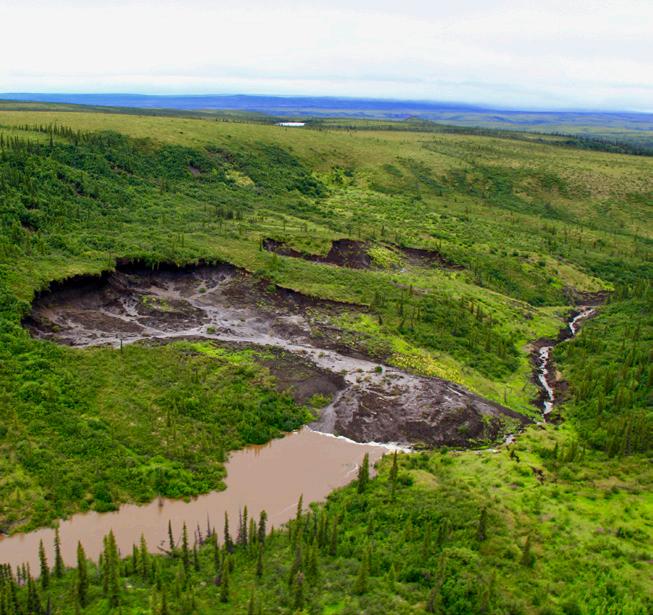
the FCS, funding 63 research grants since 2018. The latest cohort of grantees includes five projects addressing key information gaps in climate science to produce actionable insights, from quantifying understudied carbon emissions in the Arctic and the Amazon to predicting drought in the Democratic Republic of Congo.
Quantifying large greenhouse gas emissions from a retrogressive thaw slump in Alaska
LEAD: JENNIFER WATTS
COLLABORATORS: KYLE ARNDT, PATRICK MURPHY
Retrogressive thaw slumps (RTS) are extreme permafrost thaw landscape features, which occur when a section of ice-rich permafrost becomes warm enough to cause the ground ice to melt and soils to collapse. Once they start, RTS continue to expand and destroy nearby permafrost for months to years. Many RTS have been identified, but because they are often in extremely remote arctic locations, very little is known about the potentially substantial carbon emissions from RTS in the form of carbon dioxide and methane. This study will provide the first continuous measurements of carbon emissions from a RTS, collected over at least a year via an eddy covariance tower. The research is also supported by an equipment loan provided through the U.S. Department of Energy AmeriFlux Rapid Response program, which recognized this project as a valuable opportunity to advance science. The data collected will also serve as a “proof of concept” for a subsequent $1.3M proposal to the National Science Foundation for continued research at the site.
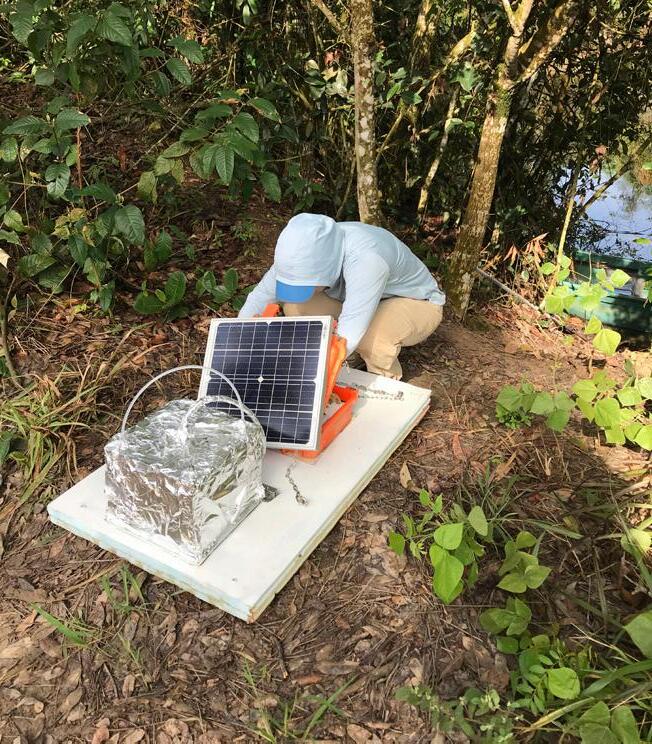
Assessing the impacts of ecosystem disturbance on carbon emissions from Arctic and Amazon ponds
LEAD: ELCHIN JAFAROV
COLLABORATORS: ZOË DIETRICH,
ANDREW MULLEN, JACKIE HUNG, MARCIA MACEDO, KATHLEEN SAVAGE
Freshwater ecosystems are significant sources of the greenhouse gases that persist in the atmosphere and contribute to warming. However, research is lacking an understanding of how disturbances like wildfire and agriculture can change these emissions. This project will address these information gaps by collecting measurements of carbon emissions from ponds, using autonomous floating chambers developed with funding from a previous FCS grant. With this new high-resolution data, the team will unlock the ability to predict year-round greenhouse gas emissions from ponds in the Arctic and the Amazon. Floating chambers will be deployed in ponds in Alaska affected by wildfires, and in agricultural reservoirs in the Amazon-Cerrado frontier. In both locations, the ability to take more frequent measurements of carbon emissions will help researchers improve models and better assess the ponds’ impacts on regional carbon budgets.
top: A retrogressive thaw slump in Canada’s Northwest Territories. / photo by Scott Zolkos
bottom: Zoë Dietrich readies an autonomous floating chamber for a trial run at Tanguro Research Station in Brazil. / photo by Sarah Ruiz
March 2024 05
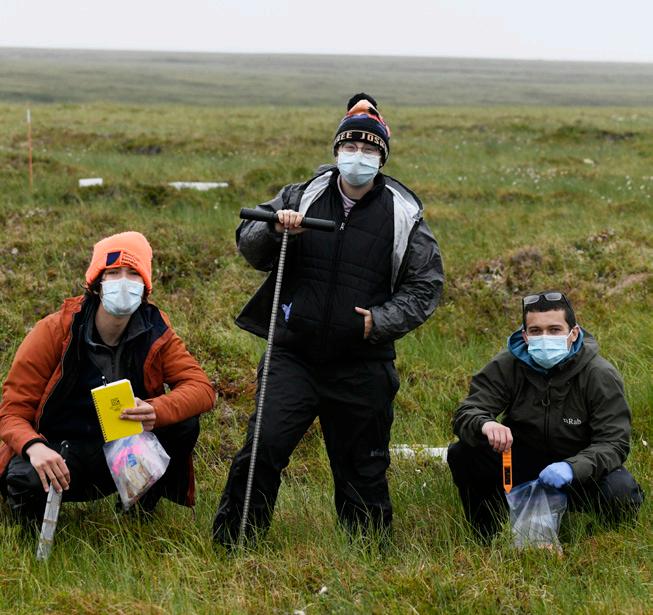
The Polaris Project: Data synthesis from almost two decades of research and student participation
LEAD: NIGEL GOLDEN
COLLABORATOR: SUE NATALI
Established in 2008, the Polaris Project has earned global recognition for its leadership in Arctic research, education, and outreach. Through the commitment to providing students with hands-on experience, Polaris has enabled numerous publications and presentations. Polaris is approaching a critical juncture in the next funding cycle, and this project will complete the first-ever comprehensive synthesis of Polaris Project research to help sustain Woodwell Climate’s sole undergraduate research program. By consolidating past research and educational achievements, the team will create a data synthesis paper to be submitted to a peer-reviewed, open-access scientific research journal, as well as a retrospective analysis of undergraduates’ research experiences with Polaris to be submitted to an education research journal. The team will also launch an online communications piece that documents past Polaris participants’ field experiences and unique journeys with a variety of narrative and artistic communications styles and elements.
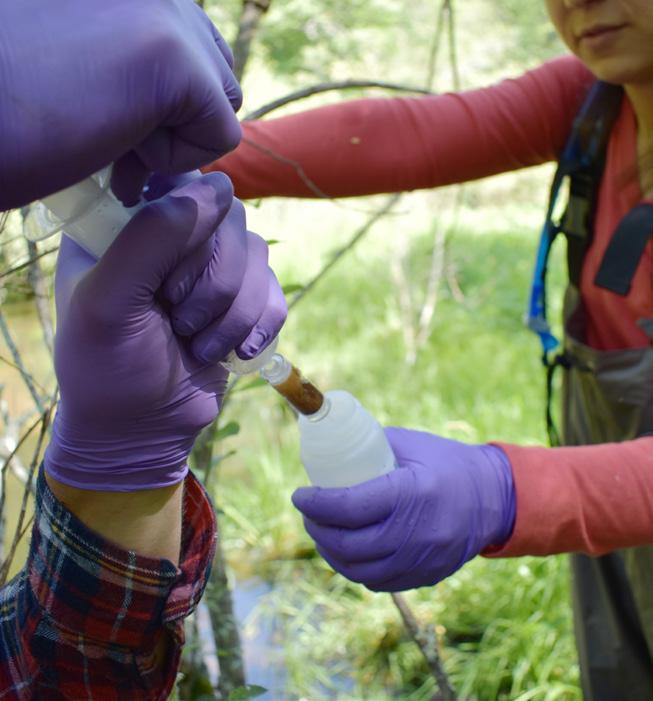
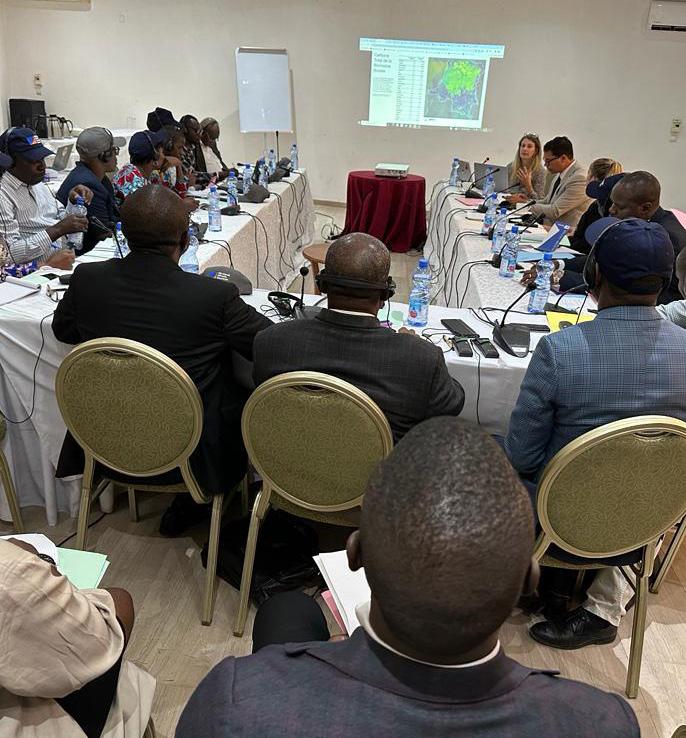
Determining the climate sensitivity of coastal rivers to guide ecosystem restoration across SE Massachusetts
LEAD: ABRA ATWOOD
COLLABORATORS: MARCIA MACEDO,
CHRIS NEILL, LINDA DEEGAN, SCOTT ZOLKOS
Coastal rivers, like those that flow into Massachusetts’ Buzzards Bay and Vineyard Sound, are fragile environments that serve critical ecological functions for native fish, downstream estuaries, and coastal wetlands. Different rivers are uniquely sensitive to changes in air temperature based on a variety of characteristics, such as their water source or shade. However, land use changes, including housing development and cranberry bogs, have affected key river characteristics and stream temperatures. This project will investigate MA coastal rivers’ sensitivity to changing air temperature, as well as how that sensitivity is affected by both connection to groundwater and the creation or restoration of cranberry bogs. The temperature sensors and geochemical analyses used in this research may be scalable beyond these rivers and yield insights to inform research approaches relevant to rivers around the world.
A drought early warning system for the DRC: Developing a seasonal forecast based on novel machine learning approaches
LEAD: CARLOS DOBLER-MORALES
COLLABORATORS:
CHRISTOPHER SCHWALM, GLENN BUSH
Seasonal weather forecasts hold immense potential to improve risk management from agricultural failure, water stress, and extreme events. However, significant advances in technical forecasting capabilities remain largely unavailable to communities without the resources to develop or customize them for their region. In 2023, Woodwell Climate Just Access co-produced a national climate risk assessment with the Democratic Republic of Congo’s Ministry of Environment and Sustainable Development. That report identified drought as a major climate threat to the DRC—one which stands to affect almost the entire country. In response, this project will develop a seasonal drought forecasting model tailored to the DRC using cutting-edge machine-learning methods. The forecast will be able to deliver precise rainfall anomaly predictions up to six months in advance for the whole country, and serve as an early warning system to help local people and decisionmakers anticipate the impacts of escalating drought risk.
top: Students who participated in the Polaris Project in 2023 conducted research in Alaska’s Yukon-Kuskokwim Delta. / photo by Logan Berner center: Sampling the Santuit River in Massachusetts. / photo by Zander Nassikas
bottom: Woodwell Climate hosted a workshop with the DRC’s Ministry of Environment and Sustainable Development. / photo by Abby Fennelly
06 Monthly Newsletter

In the news: highlights
In the “Witness Community Highlight” from the Arctic Research Consortium of the US (ARCUS), Dr. Sue Natali talks about her listening-based approach to supporting Indigenous-led decisionmaking in permafrost research, and how she learned to be a better science communicator from a seventh grade science teacher.
The Climate Emergency Forum welcomed Dr. Jennifer Francis to discuss two of her recent papers on weather whiplash.
In response to Acre, Brazil’s second-worst flooding event in 40 years, Dr. Foster Brown was interviewed on TV Gazeta Rio Branco’s “Gazeta Entrevista” about what is going on with the climate (Portuguese). Foster was also interviewed by a journalist about the risk of the Acre River flooding to 20 meters in the near future—the interview was quoted in Notícias da Hora, and posted as a video to the journalist’s Instagram.
The Houston Chronicle covered CERAWeek events on climate risk, quoting Dr. R. Max Holmes’ remarks during a panel on the links between climate change and extreme events.
Dr. Manoela Machado was quoted on the link between deforestation and fire in the Amazon in a widely syndicated article, from The Japan Times to The Deccan Herald
The Merit Times wrote an article about Dr. Ludmila Rattis and her research on tapirs and Amazon reforestation.
An article from MIT News quoted Dr. Jon Sanderman to provide context on a recent study examining the climate impacts of grazing land management practices.
MV Times interviewed Dr. Chris Neill for an article about naturalists’ work to fight invasive southern pine beetles on Martha’s Vineyard.
Dr. Marcia Macedo was interviewed for an article in Agência Brasil about her long-term research at Tanguro studying the environmental impacts of agriculture. The article was syndicated to more than 140 Portuguese-language outlets this week.
Woodwell Climate @ Mountainfilm
Woodwell Climate Research Center is once again partnering with Mountainfilm in Telluride, CO this Memorial Day weekend to elevate stories and generate conversations that inspire climate action and environmental stewardship.
Woodwell Climate has been a Mountainfilm sponsor and participant for several years. Each year is memorable and brings fresh ideas, connections, and collaborations and this year promises to be thought-provoking and action inspiring, with climate change featured front and center in films and events.
To learn more, visit the website at: www.mountainfilm.org
Dr. Jen Francis was quoted by Energy Central and News Directory 3 on the relevance of a recent study that suggests that cold Arctic meltwater is connected to European heatwaves.
The Boston Globe quoted Dr. Jennifer Francis in an article on recent record-breaking temperatures.
AP News quoted Dr. Jen Francis in an article about how February, winter as a whole, and the world’s oceans are all breaking temperature records. The article was syndicated to outlets around the world, including TIME, The Boston Globe, The Independent, The Toronto Star, The New Indian Express, and Terra
Dr. Jen Francis was quoted in an article by CNN and interviewed on KCBS Radio, providing her opinion on a new company that ships Arctic ice from Greenland to high-end bars in Dubai. Between the two stories, Jen had over 300 media mentions in one week.
Drs. Abby Lute and Alex Naegele gave a virtual presentation on state-wide heat projections at a workshop for the Kerala State Disaster Management Authority—both The New Indian Express and The Hindu Businessline covered the event.
In “Source or sink?” AGU’s news magazine Eos spotlighted the recent review, “Permafrost Carbon: Progress on Understanding Stocks and Fluxes Across Northern Terrestrial Ecosystems,” an update on what we know about carbon fluxes in the North by Claire Treat and co-led by Dr. Anna Virkkala and Permafrost Pathways collaborators.
Dr. Jen Francis was quoted by Inside Climate News to provide context on a recent study’s findings linking melting Arctic ice and extreme summer weather in Europe.
ACCESS published a story covering the first publication from the PDG supported by the Google.org award, which examined using deep learning to understand permafrost thaw and human-built infrastructure.
07 March 2024
PHOTO BY BEN ENG / COURTESY OF MOUNTAINFILM

CLIMATE SCIENCE FOR CHANGE cover: Zoë Dietrich deploys an autonomous floating chamber at Tanguro Research Station in Brazil. / photo by Sarah Ruiz 149 Woods Hole Road Falmouth, MA, 02540-1644 woodwellclimate.org/give @woodwellclimate #sciencefortheworld Donations play an important role in securing the future of Woodwell Climate Research Center’s work—and help safeguard the health of our planet for generations to come. Please help us to conserve paper. To receive this newsletter electronically, please send your email address to info@woodwellclimate.org.
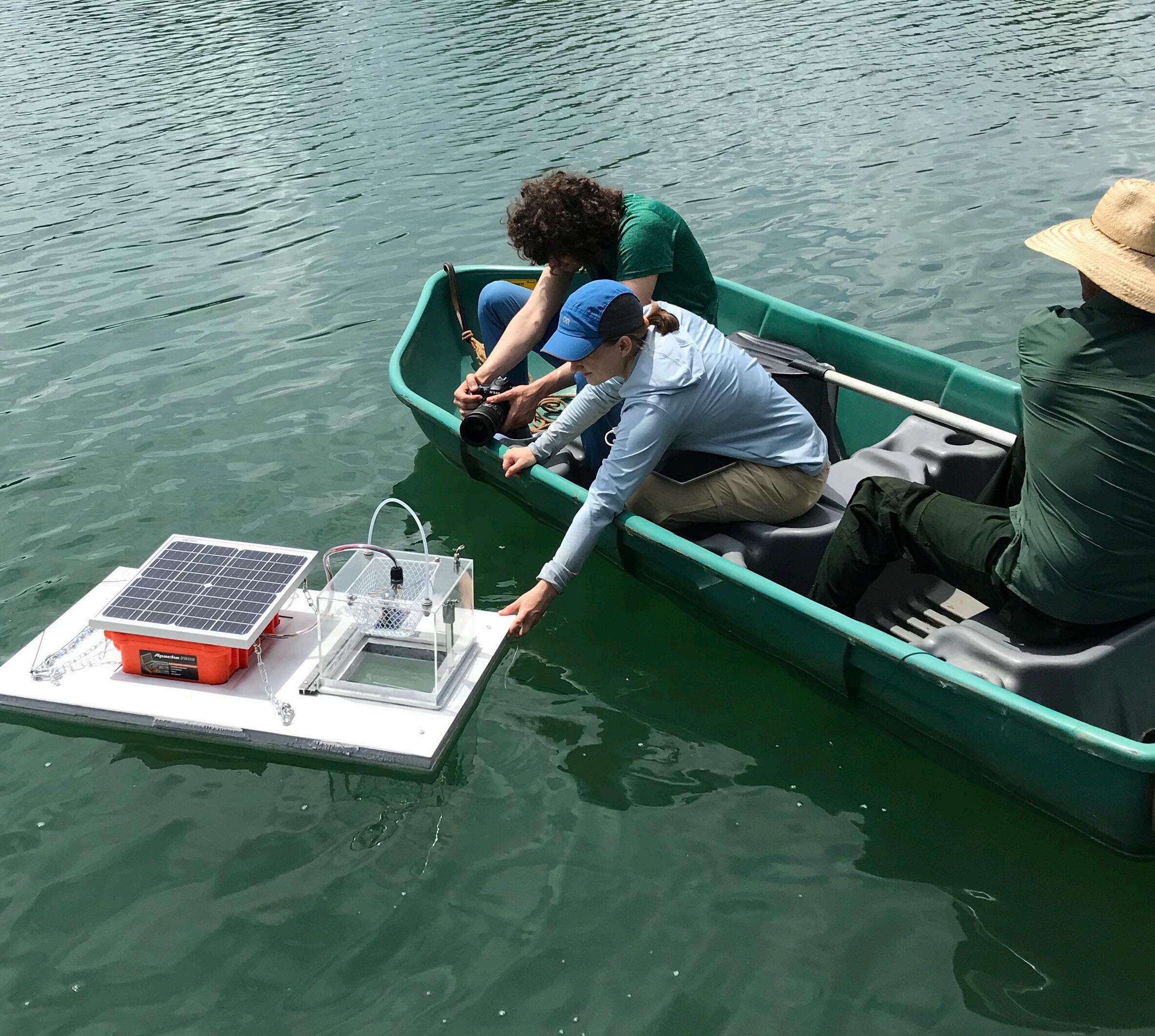



 Swamplands in Howland Forest, Maine. / photo courtesy of Kathleen Savage
3 Large-area mapping of land cover, use, disturbances, and management activities
Swamplands in Howland Forest, Maine. / photo courtesy of Kathleen Savage
3 Large-area mapping of land cover, use, disturbances, and management activities









